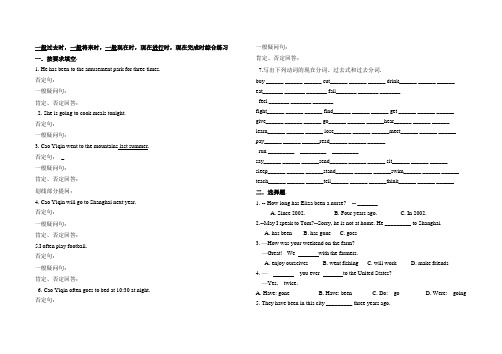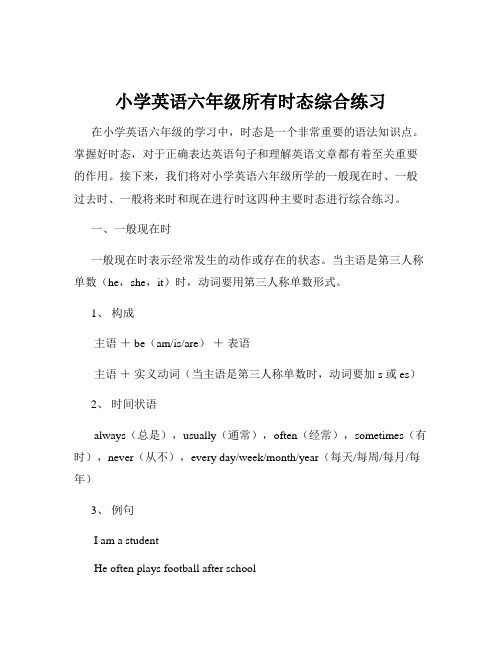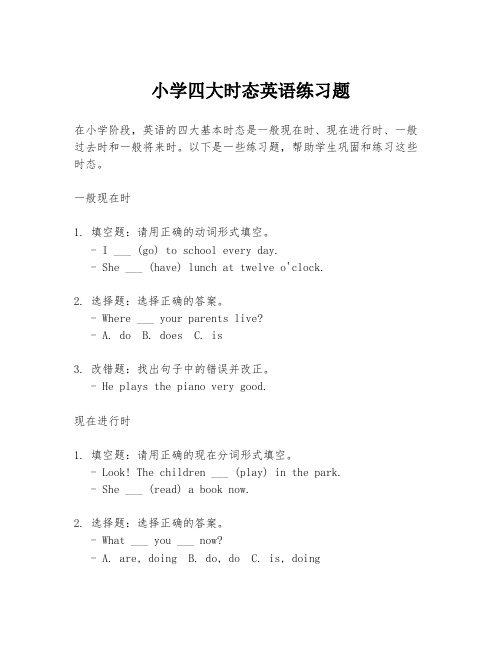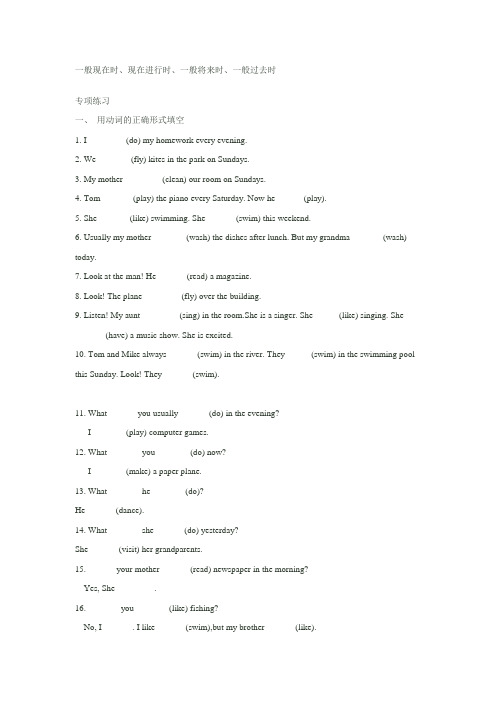小升初英语(一般现在时、一般将来时、一般过去时)时态练习
一般现在时-一般过去时-一般将来时-现在完成时综合练习

一般过去时,一般将来时,一般现在时,现在进行时,现在完成时综合练习一.按要求填空.1. He has been to the amusement park for three times.否定句:一般疑问句:肯定、否定回答:2. She is going to cook meals tonight.否定句:一般疑问句:3. Cao Yiqin went to the mountains last summer.否定句:_一般疑问句:肯定、否定回答:划线部分提问:4. Cao Yiqin will go to Shanghai next year.否定句:一般疑问句:肯定、否定回答:5.I often play football.否定句:一般疑问句:肯定、否定回答:6. Cao Yiqin often goes to bed at 10:30 at night.否定句:一般疑问句:肯定、否定回答:7.写出下列动词的现在分词、过去式和过去分词.buy ______ ______ ______ cut______ ______ ______ drink______ ______ ______eat_______ _______ _______ fall_______ _______ _______feel _______ _______ _______fight______ ______ ______ find______ ______ ______ get ______ ______ ______ give______ ______ ______ go______ ______ ______hear______ ______ ______learn______ ______ ______ lose______ ______ ______meet______ ______ ______ pay______ ______ ______read______ ______ ______run _________ _________ _________say______ ______ ______send______ ______ ______ sit______ ______ ______sleep______ ______ ______stand______ ______ ______swim______ ______ ______ teach______ ______ ______tell______ ______ ______think______ ______ ______ 二.选择题.1. -- How long has Eliza been a nurse? -- _______A. Since 2002.B. Four years ago.C. In 2002.2.--May I speak to Tom?--Sorry, he is not at home. He _________ to Shanghai.A. has beenB. has goneC. goes3. —How was your weekend on the farm?—Great! We with the farmers.A. enjoy ourselvesB. went fishingC. will workD. make friends4. —you ever to the United States?—Yes, twice.A. Have: goneB. Have: beenC. Do: goD. Were: going5. They have been in this city _________ three years ago.A. forB. aboutC. since6. ―have you been learning English?―I have been learning English for six years.A. How longB. How oftenC. How far7.--Where is Zhang Ming?-- Oh, he _____ to Beijng and he will be back tomorrow.A. has beenB. has goneC. goes8. The Greens____supper now. A:is having B:are;having C:is haveing9.____you usually _____to school with classmates?A. Do, comesB. does, comeC. Do, come10.Mr Green usually______newspapers after supper every day.A. readB. readingC. reads11.______Helen____________(wash )clothes? Yes ,she is .A. Is, washingB. Does , washC. Is, washes12. There ________ a dolphin show in the zoo tomorrow evening.A. wasB. is going to haveC. will haveD. is going to be13. He ________ her a beautiful hat on her next birthday.A. givesB. gaveC. will givingD. is going to giving14. There __________ a meeting tomorrow afternoon.A. will be going toB. will going to beC. is going to beD. will go to be 三.填空题.1.我母亲通常在星期日打扫卫生、洗衣服。
小升初时态练习题——拔高提升版

知识点睛:动词主要了解be动词、情态动词和实义动词,这里主要讲解动词在各种时态中的变化规则。
1、一般现在时:一般现在时的构成(1)be动词:主语+be(am, is, are)+其它;如:I am a boy. 我是一个男孩。
(2)行为动词:主语+行为动词(+其它);如: We study English. 我们学习英语。
注意:当主语为第三人称单数(he, she, it)时,要在动词后加“-s”或“-es”。
如:Mary likes Chinese.玛丽喜欢汉语。
动词+s的变化规则(1)一般情况下,直接加-s,如:cook-cooks, milk-milks;(2)以s. x. sh. ch. o结尾,加-es,如:guess-guesses, wash-washes,watch-watches, go-goes;(3)以“辅音字母+y”结尾,变y为i,再加-es,如:study-studies;2、一般过去时:动词的过去式的构成规则有:(1)规则动词①一般直接在动词的后面加ed:如worked , learned , cleaned , visited;②以e结尾的动词直接加d:如lived , danced , used;③以辅音字母加y结尾的动词要改y为i再加ed(此类动词较少)如study –studied carry – carried worry–worried (注意play、stay不是辅音字母加y,所以不属于此类);④双写最后一个字母(此类动词较少)如stopped;(2)不规则动词(此类词并无规则,须熟记)小学阶段要记住以下动词的原形和过去式:sing – sang , eat– ate ,see – saw , have – had , do – did , go – went , take – took , buy – bought , get –got ,read – read,fly – flew , am/is – was ,are – were , say – said ,leave – left , swim – swam , tell – told , draw – drew ,come – came , lose– lost , find – found , drink – drank , hurt –hurt , feel – felt;3、一般将来时:基本结构:(1)be going to + do;(2)will+ do. be going to = willI am going to go swimming tomorrow(明天). = I will go swimming tomorrow.4、现在进行时: am,is,are+动词现在分词;动词的ing形式的构成规则:(1)一般的直接在后面加上ing ,如doing , going , working , singing ,eating;(2)以e 结尾的动词,要先去e再加ing,如having , writing;(3)双写最后一个字母的(此类动词极少)有:running , swimming ,sitting , getting;知识点冲刺训练一、单项选择1.( )She ____ curly black hair and ____ glasses.A.wear; hasB.has; wearC.has; wears2.( )We're going to ____ the Eiffel Tower.A.lookB.watchC.see3.( )My mother ____ me ____ my school by car every day.A.took; toB.takes; toC.takes; for4.( )He ____ English because he was ill.A.didn't go to studyB.doesn't go to studyC.went to study5.( )—____ your father ____ at home?—No, he ____ in a factory.A.Is; work; workB.Does; work; worksC.Is; works; works6.( )—I ____ a present for you.—Thanks a lot.A.gaveB.sentC.bought7.( )—What ____ he look like?—He is tall.A.isB.doesC.are8.( )—Where are the students?—____ in the playground.A.She'sB.There areC.They're9.( )____, everyone. The floor is very wet.A.Watch outB.Look oute outD.Make out 10.( )There ____ any people on the farm yesterday afternoon.A.isn'tB.wereC.weren't二、句型转换11.按要求完成句子(每空一词)。
小升初英语专题: 时态

一、一般现在时表示经常性或习惯性的动作。
通常会与Usually, often , every, sometime,always搭配。
1、一般现在时的构成1)、肯定句a、be动词:主语+be动词(am, is, are)+其它。
如:I am a boy.b、行为动词:主语+行为动词+其它。
如:We study English.当主语为第三人称单数(he, she,it)时,要在动词后加"-s"或"-es"。
如:Mary likes Chinese.玛丽喜欢汉语。
练习1. He often ________(have) dinner at home.2. Daniel and Tommy _______(be) in Class One.2)、否定句a、be动词:主语+be动词+not+其它。
如:He is not a student.b、行为动词:主语+don’t(doesn’t)+动词原形+其它。
如:I don’t like you.练习3. We _______( watch) TV on Monday.(否定句)4. Nick _______( go) to the zoo on Sunday.(否定句)3)、一般疑问句a、be动词:be动词+主语+其它。
如:Are you a student?b、行为动词:Do(Does) +主语+行为动词+其它。
如:Do you often play football?练习5. ______ they ________(like) the World Cup?6. you tired?4)、特殊疑问句特殊疑问句的结构是:特殊疑问词+ 一般疑问句。
所以,动词的变化同一般疑问句。
如:Whatis this?/ What do you like to do?练习7. What _______they often _______(do) on Saturdays?8. What your favorite food?2、主语为第三人称单数时,动词的变化1.一般情况下,直接加-s,如:cook-cooks, milk-milks2.以结尾,加-es,如:guess-guesses, wash-washes, watch-watches, go-goes3.以, 再加-es,如:study-studies练习写出下列动词的第三人称单数drink ________ go _______ stay ________ make ________look _________ have_______ pass_______ carrycome________ watch______ plant_______ fly ________study_______ brush________ do_________ teachwash_______3、一般现在时的功能1.表示事物或人物的特征、状态。
小学英语六年级所有时态综合练习

小学英语六年级所有时态综合练习在小学英语六年级的学习中,时态是一个非常重要的语法知识点。
掌握好时态,对于正确表达英语句子和理解英语文章都有着至关重要的作用。
接下来,我们将对小学英语六年级所学的一般现在时、一般过去时、一般将来时和现在进行时这四种主要时态进行综合练习。
一、一般现在时一般现在时表示经常发生的动作或存在的状态。
当主语是第三人称单数(he,she,it)时,动词要用第三人称单数形式。
1、构成主语+ be(am/is/are)+表语主语+实义动词(当主语是第三人称单数时,动词要加 s 或 es)2、时间状语always(总是),usually(通常),often(经常),sometimes(有时),never(从不),every day/week/month/year(每天/每周/每月/每年)3、例句I am a studentHe often plays football after schoolThey are very happy练习:1、 My father ______ (watch) TV every night2、 She ______ (like) music very much3、 The children often ______ (play) in the park二、一般过去时一般过去时表示过去发生的动作或存在的状态。
1、构成主语+ was/were +表语主语+动词的过去式2、时间状语yesterday(昨天),last week/month/year(上周/上个月/去年),ago(以前),in +过去的年份3、例句I was at home yesterdayThey played basketball last weekHe went to Beijing two years ago练习:1、 We ______ (have) a party last night2、 She ______ (buy) a new dress yesterday3、 He ______ (do) his homework an hour ago三、一般将来时一般将来时表示将来要发生的动作或存在的状态。
小升初语法辨析一般现在时一般过去时一般将来时(讲义)人教PEP版英语六年级下册

小升初英语语法辨析:一般现在时、一般过去时、一般将来时&专项模拟练习一、一般现在时1.定义:表示经常发生的动作、存在的状态或普遍真理。
2.时间标志词:often(经常)、usually(通常)、always(总是)、sometimes(有时)、every day/week/month/year(每天/ 周/ 月/ 年)等。
3.结构:1.主语(非第三人称单数)+ 动词原形。
例如:You play basketball afterschool.(你放学后打篮球。
)2.主语(第三人称单数)+ 动词的第三人称单数形式。
例如:He playsbasketball after school.(他放学后打篮球。
)4.用法:1.表示经常性或习惯性的动作。
如:I go to school by bike every day.(我每天骑自行车去上学。
)2.表示现在的状态或特征。
如:She is tall and thin.(她又高又瘦。
)3.表示客观事实或普遍真理。
如:The earth moves around the sun.(地球绕着太阳转。
)二、一般过去时1.定义:表示过去某个时间发生的动作或存在的状态。
2.时间标志词:yesterday(昨天)、last week/month/year(上周/ 上个月/ 去年)、ago(……以前)、in + 过去的年份等。
3.结构:主语+ 动词的过去式。
例如:You played basketball yesterday.(你昨天打了篮球。
)4.用法:1.表示过去某个时间发生的动作。
如:I went to the park last Sunday.(我上周日去了公园。
)2.表示过去存在的状态。
如:He was happy yesterday.(他昨天很开心。
)三、一般将来时1.定义:表示将来某个时间要发生的动作或存在的状态。
2.时间标志词:tomorrow(明天)、next week/month/year(下周/ 下个月/ 明年)、in the future(在未来)等。
一般现在时、一般过去时、现在进行时、现在完成时、过去完成时、过去将来时、一般将来时初中全部时态练习题

12. Mr. Green oБайду номын сангаасten __ his newspapers at night. But he ___ an interesting book tonight.
A. reads; reads B. reads; read C. reads; is going to read
19. Look! Two cats ______ across the wall.A. run B. runsC. are running
20. She ____ tea, but he ___ .A. likes; doesn’t B; like; don’t C. like; doesn’t
21. ---How many ________ in the tree? ---There are two.
A. bird are ther B. birds is ther C. birds are there D.birds are their
22.. Mr Johnson usually goes to the hospital ________.
A. by his car B. by the black car C. by car D. by the new car
20. ________ you ______ (collect) stamps? Yes. I _______ . ________ your brother ______ (collect), too? No, he ________ .
二、选择题
1. _____ he _____ to the park at 6:30 inthe morning? No,he _____ .
小学四大时态英语练习题

小学四大时态英语练习题在小学阶段,英语的四大基本时态是一般现在时、现在进行时、一般过去时和一般将来时。
以下是一些练习题,帮助学生巩固和练习这些时态。
一般现在时1. 填空题:请用正确的动词形式填空。
- I ___ (go) to school every day.- She ___ (have) lunch at twelve o'clock.2. 选择题:选择正确的答案。
- Where ___ your parents live?- A. do B. does C. is3. 改错题:找出句子中的错误并改正。
- He plays the piano very good.现在进行时1. 填空题:请用正确的现在分词形式填空。
- Look! The children ___ (play) in the park.- She ___ (read) a book now.2. 选择题:选择正确的答案。
- What ___ you ___ now?- A. are, doing B. do, do C. is, doing3. 改错题:找出句子中的错误并改正。
- They are going to the zoo tomorrow.一般过去时1. 填空题:请用正确的过去式动词填空。
- I ___ (visit) my grandparents last weekend. - She ___ (go) to the library yesterday.2. 选择题:选择正确的答案。
- What time ___ he ___ up this morning?- A. did, get B. does, get C. is, getting3. 改错题:找出句子中的错误并改正。
- She was watched a movie last night.一般将来时1. 填空题:请用正确的将来时态动词填空。
- I ___ (go) to the beach next weekend.- They ___ (have) a party on Friday.2. 选择题:选择正确的答案。
(完整版)一般现在时,一般过去时,现在进行时,一般将来时练习

一般现在时、现在进行时、一般将来时、一般过去时专项练习一、用动词的正确形式填空1. I ________ (do) my homework every evening.2. We _______ (fly) kites in the park on Sundays.3. My mother ________ (clean) our room on Sundays.4. Tom _______(play) the piano every Saturday. Now he______ (play).5. She _______(like) swimming. She ______ (swim) this weekend.6. Usually my mother _______ (wash) the dishes after lunch. But my grandma_______ (wash) today.7. Look at the man! He ______ (read) a magazine.8. Look! The plane ________ (fly) over the building.9. Listen! My aunt ________ (sing) in the room.She is a singer. She _____ (like) singing. She_______(have) a music show. She is excited.10. Tom and Mike always ______ (swim) in the river. They _____ (swim) in the swimming pool this Sunday. Look! They ______ (swim).11. What ______ you usually ______ (do) in the evening?I _______ (play) computer games.12. What _______ you _______ (do) now?I _______ (make) a paper plane.13. What _______ he _______ (do)?He ______ (dance).14. What _______ she ______ (do) yesterday?She ______ (visit) her grandparents.15. ______ your mother ______ (read) newspaper in the morning?Yes, She ________ .16. _______ you _______ (like) fishing?No, I ______ . I like ______ (swim),but my brother ______ (like).17. How ______ your father _______ (go) to work every day?He ______ (go) by bike. But it’s cold today. He ______ (take) the No.21 bus,, and he _______ (go) to work by taxi yesterday.18. _______ the monkey _______ (like) climbing trees? Yes, it _______ .19. What _______ your father ______ (do) after lunch? He _______ (read) a comic book. What _____ he _______(do) today? He _______ (clean) the kitchen for my grandma. Look!He (clean).20. ________ you ______ (collect) stamps? Yes. I _______ .________ your brother ______ (collect), too? No, he ________ .二、选择题1. _____ he _____ to the park at 6:30 in the morning? No,he _____ .A. Does; goes; doesB. Does; go; doesn’tC. Does; go; does2. What colour _____ you _____ this bookcase? I _____ it pink.A. are; going to paint; am going to paintB. do; paint; paintC. did; paint; painted3. Tim always _____ a picture at home. He _____ a car now.A. draws; is drawingB. draw; drawC. draws; draw4. She usually _____ her friends. They often _____ tea.A. see; drinkB. sees; drinksC. sees; drink5. He usually _____ the dishes at night, but tonight he _____ clothes.A. wash; washB.washes; is going to washC. is washing; washes6. Mr. Green usually _____ his newspaper in the evening, but he and his wife _____ television yesterday evening.A.reads; watchesB.reads; is going to watchC.reads; watched7. Where are the man and the woman? They _____ near the tree.A. sitB. satC. are sitting8. _____ your penpal _____ diving? No, he _____ .He ______ writing stories.A. Does; like; doesn’t; likesB. Does; likes; doesn’t; likeC. Do; like; don’t; likes9. _____ you _____ fishing yesterday? No, we _____ .A. Does; go; doesn’tB. Did; go; didn’tC. Do; go; don’t10. Open the window, Please. Look! He _____ it.A. opensB. is openningC. is opening11. I usually _____ some milk every day. But I _____ coffee yesterday.A. drink; drankB. is drinking; drinkC. drank; am drinking12. Mr. Green often _____ his newspapers at night. But he _____ an interesting book tonight.A. reads; readsB. reads; readC. reads; is going to read13. The old man _____ playing sports in the park. He _____ morning exercise now.A. likes; is doingB. likes; doesC. like; doing14. What _____ you usually _____ in the evening? I ______ computer games.What _____ you _____ last night? I _____ a book.A. do; do; playB. did; do; playedC. does; do; playsdid; do; read do; do; read do; do; am reading15. Where ______ the boy _____ ? He _____ across the river now.A. does; swim; swimsB. is; swimming; is swimmingD. is; swimming; is swimming16. _____ you _____ to music now? Yes, we _____ .A. Do; listen; doB. Did; listen; didC. Are; listening; are17. Put on you coat, please. OK. I ______ it on.A. am puttingB. am going to putC. put18. _____ you ______ coffee? Yes, I ______ .A. Do; like; doB. Did; like; didC. Are; like; am19. Look! Two cats ______ across the wall.A. runB. runsC. are running20. She _____ tea, but he _____ .A. likes; doesn’t B; like; don’t C. like; doesn’t。
- 1、下载文档前请自行甄别文档内容的完整性,平台不提供额外的编辑、内容补充、找答案等附加服务。
- 2、"仅部分预览"的文档,不可在线预览部分如存在完整性等问题,可反馈申请退款(可完整预览的文档不适用该条件!)。
- 3、如文档侵犯您的权益,请联系客服反馈,我们会尽快为您处理(人工客服工作时间:9:00-18:30)。
一般现在时一、写出下列动词的第三人称单数talk______forget______hope______stop______perform______p lay______ say______buy______worry______fly______study_______like_______make______ take______love_______recite_______become_______come_______drive_______ shine_______leave_____wake_______ride_______write_______hike______give______see______swim______stop______shop_______plan______get_______ sit_______let_______ cut_______run_______forget_______begin_______wash_____watch_______finish______teach_____fish_______reach_______go_______do_____二、用括号内动词的适当形式填空。
1. He often ________(have) dinner at home.2. Daniel and Tommy _______(be) in Class One.3. We _______(not watch) TV on Monday.4. Nick _______(not go) to the zoo on Sunday.5. ______ they ________(like) the World Cup?6. What _______they often _______(do) on Saturdays?7. _______ your parents _______(read) newspapers every day?8. The girl _______(teach) us English on Sundays.9. She and I ________(take) a walk together every evening.10. There ________(be) some water in the bottle.11. Mike _______(like) cooking.12. They _______(have) the same hobby.13. My aunt _______(look) after her baby carefully.14. You always _______(do) your homework well.15. I _______(be) ill. I’m staying in bed.16. She _______(go) to school from Monday to Friday.17. Liu Tao _______(do) not like PE.18. The child often _______(watch) TV in the evening.19. Su Hai and Su Yang _______(have) eight lessons this term.20. -What day _______(be) it today? -It’s Satu rday.21 We often ___________ (play) in the playground.22. He _________ (get) up at six o'clock.23. ________ you __________ (brush) your teeth every morning?24. What ________(do) he usually ________ (do) after school?25. Danny ____________ (study) English, Chinese, math, science and art at school.一般将来时( ) 1. There __________ a meeting tomorrow afternoon.A.will be going toB. will going to beC. is going to beD. will go to be( ) 2. Charlie ________ here next month.A. isn’t workingB. doesn’t workingC. isn’t going to workingD. won’t work ( ) 3. He _____ very busy this week, he ______free next week.A. will be; isB. is; isC. will be; will beD. is; will be( ) 4. There _____a dolphin show in the zoo tomorrow evening.A. wasB. is going to haveC. will haveD. is going to be( ) 5. –________ you ________ free tomorrow?– No. I ________ free the day after tomorrow.A.Are; going to; willB. Are; going to be; willC. Are; going to; will beD. Are; going to be; will be( ) 6. Mother ________ me a nice present on my next birthday.A. will givesB. will giveC. givesD. give( ) 7. – Shall I buy a cup of tea for you? –________.A. No, you won’t.B. No, you aren’t.C. No, please don’t.D. No, please. ( ) 8. – Where is the morning paper?– I ________ if for you at once.A. getB. am gettingC. to getD. will get( ) 9. ________ a concert next Saturday?A. There will beB. Will there beC. There can beD. There are ( ) 10. If they come, we ________ a meeting.A. haveB. will haveC.hadD. would have( )11. He ________ her a beautiful hat on her next birthday.A. givesB. gaveC. will givingD. is going to giving( ) 12. He ________ to us as soon as he gets there.A. writesB. has writtenC. will writeD. wrote( ) 13. He ________ in three days.A. coming backB. came backC. will come backD. is going to coming back ( ) 14. If it ________ tomorrow, we’ll go roller-skating.A. isn’t rainB. won’t rainC. doesn’t rainD. doesn’t fine( ) 15. – Will his parents go to see the Terra Cotta Warriors tomorrow?– No, ________ (不去).A. they will n’t.B. they won’t.C. they aren’t.D. they don’t.( ) 16. Who ____we _______swimming with tomorrow afternoon?A. will; goB. do; goC. will; goingD. shall; go( ) 17. We ________ the work this way next time.A. doB. will doC. going to doD. will doing( ) 18. Tomorrow he ________ a kite in the open air first, and then ________ boating in the park.A. will fly; will goB. will fly; goesC. is going to fly; will goesD. flies; will go ( ) 19. The day after tomorrow they _____ a volleyball match.A. will watchingB. watchesC. is watchingD. is going to watch( ) 20. There ________ a birthday party this Sunday.A. shall beB. will beC. shall going to beD. will going to be一般过去时练习题一、单项选择:从下列各题后所给的四个选项中选择最佳答案填空。
(10)( )1.My father______ill yesterday.A.isn't B.aren't C.wasn't D.weren't( )2.______your parents at home last week﹖A.Is B.Was C.Are D.Were()3.The twins______in Dalian last year.They______here now.A.are; were B.were; are C.was; are D.were; was( )4.______your father at work the day_____yesterday(前天)﹖A.Was; before B.Is; before C.Was; after D.Is; after( )5.—Who was on duty last Friday﹖—______.A.I am B.I was C.Yes, I was D.No, I wasn't二、请用正确动词形式填空。
